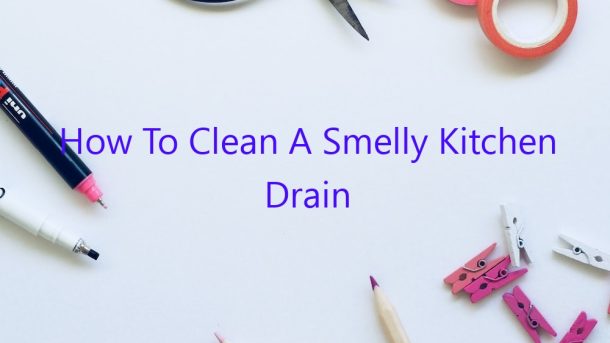If your kitchen sink has a foul smell, it may be due to a clogged kitchen drain. Kitchen drains often become clogged with food particles, grease, and soap scum. If not cleaned on a regular basis, these materials can build up and create a foul smell.
Fortunately, there are several ways to clean a smelly kitchen drain. The most effective way to clean a kitchen drain is to use a commercial drain cleaner. However, if you are uncomfortable using a chemical drain cleaner, there are several other methods that you can try.
One way to clean a kitchen drain is to pour a pot of boiling water down the drain. This will help to loosen up any food particles or grease that may be clogging the drain. You can also try using a plunger to dislodge any clogs.
If the clog is not too severe, you may be able to remove it by hand. First, remove the drain cover and try to dislodge the clog with a pair of tongs. If that doesn’t work, you can try using a plunger or a wire hanger.
If the clog is still stubborn, you may need to call a plumber. A plumber can use a snake to clear the clog and restore proper drainage to your sink.
Contents
Why does my kitchen drain smell?
Your kitchen drain smells for a reason. It’s likely that something is rotting or decaying in the drainpipe, and that smell is what’s wafting up to your nose.
There are several things that can cause your kitchen drain to smell bad. One common culprit is food waste. If you don’t clean your dishes and kitchen counters properly, food particles can build up and cause the drain to smell. Another possibility is that you’re not emptying your trash cans often enough. If the garbage starts to rot, the smell will waft into the kitchen.
Another common kitchen drain problem is a clog. If something is blocking the drainpipe, the smell will become trapped and get worse and worse. A clog can be caused by anything from food waste to hair to soap scum.
If your kitchen drain smells bad, there are several things you can do to fix the problem. The first step is to identify the source of the smell. Once you know what’s causing the smell, you can take steps to fix it.
If the smell is coming from food waste, make sure to clean your dishes and kitchen counters properly. Be sure to empty your trash cans frequently, and avoid putting too much food waste down the drain.
If the smell is coming from a clog, you may need to call a plumber to clear the clog. A plumber can use a variety of methods to clear a clog, including a plunger, a snake, or a hydrojet.
If you’re having trouble identifying the source of the smell, or if the smell persists, it’s best to call a plumber for help. A plumber can inspect your drainpipe and identify the source of the problem. He or she can then recommend the best way to fix it.
What can I pour down my drain to get rid of smell?
There are many things that you can pour down your drain to get rid of smells. One common option is bleach. You can pour a small amount of bleach down your drain to kill any bacteria that may be causing the smell. Another option is baking soda. You can pour a cup of baking soda down your drain and let it sit for a few minutes. Then, pour a pot of boiling water down the drain to help dissolve the baking soda. Finally, you can try vinegar. You can pour a cup of vinegar down your drain and let it sit for a few minutes. Then, pour a pot of boiling water down the drain to help dissolve the vinegar.
How do you clean and deodorize a sink drain?
Sink drains can become clogged with grease, food particles, and hair, which can lead to unpleasant smells. Luckily, there are a few simple steps you can take to clean and deodorize your sink drain.
To clean your sink drain, start by pouring a pot of boiling water down the drain. This will help to dislodge any food or grease that may be clogging the drain. Next, use a plunger to suction the drain and clear any remaining debris. Finally, pour a cup of baking soda down the drain, followed by a cup of vinegar. The baking soda and vinegar will help to break down any remaining grease or gunk, and will leave your drain smelling fresh and clean.
Can I pour bleach down the drain?
Can you pour bleach down the drain?
Bleach is a corrosive substance and, as such, it can damage the pipes in your home if you pour it down the drain. In addition, bleach can also harm the environment if it makes its way into waterways.
If you have a clog in your drain, it is best to use a plunger or a snake to clear it. If these methods don’t work, you can call a plumber to help you clear the clog.
Why does under my kitchen sink smell like sewer?
There are a few reasons why your kitchen sink might smell like sewer. One reason is that a sewer gas line might be leaking. Another reason is that there might be a clog in your sink’s drainpipe, which is allowing the smell of rotting waste to escape. A third possibility is that you might have a mouse or rat infestation, and their droppings are causing the smell.
If you think that your kitchen sink is smelling like sewer because of a gas leak, you should call a plumber to fix it. If you think that the smell is coming from a clog in your sink’s drainpipe, you can try to fix it yourself using a plunger. If you think that the smell is coming from a mouse or rat infestation, you should call a pest control company to get rid of the pests.
Is it OK to pour bleach down the drain?
It is not recommended to pour bleach down the drain. Bleach is a corrosive agent and can damage the pipes in your home. If you do pour bleach down the drain, be sure to rinse the area with water to minimize any damage.
Why does my sink smell like sewer?
If your sink smells like sewer, it could be a sign that there is a clog in your drain. Sewer gas can escape from a clogged drain and cause your sink to smell bad.
There are a few things you can do to try to fix the problem. First, try pouring a pot of boiling water down the drain. This can help to dissolve any clogs. If that doesn’t work, you may need to use a plunger to try to clear the clog.
If the smell persists, it may be a sign that you need to call a plumber. There could be a more serious problem with your drain that requires professional attention.




